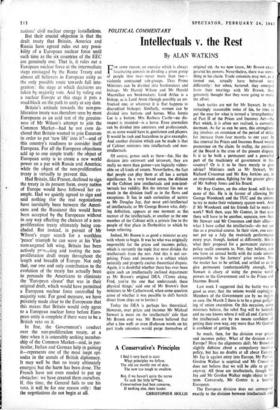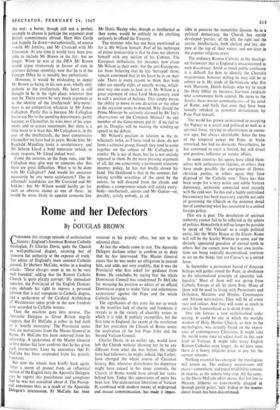Intellectuals v. the Rest
POLITICAL COMMENTARY
By ALAN WATKINS
El OR some reason, an exercise which is always r fascinating consists in dividing a given group of people into two—never more than two— violently contrasted sub-groups. Thus Prime Ministers can be divided into bookmakers and bishops. Mr Harold Wilson and Mr Harold Macmillan are bookmakers; Lord Attlee is a bishop, as is Lord Avon (though possibly an un- frocked one, or whatever it is that happens to discredited bishops). Similarly, women can be divided into buttons and horses. Miss Jennie Lee is a button; Mrs Barbara Castle—no dis- respect is intended—is a horse. Even journalists can be divided into amateurs and professionals, or, as some would have it, gentlemen and players. It would be rash and hazardous to give examples. And another division which can be made is that of Cabinet ministers into intellectuals and non- intellectuals.
Of course, games such as these—for, like the division into extrovert and introvert, they are really no more than games--are logically vulner- able on all kinds of counts. Nevertheless, the fact that people can play them at all has a certain significance. In a very broad sense, the division of the Cabinet into intellectuals and non-intel- tectuals has validity. But the interest lies not so much in the division itself as in the flaws and exceptions. It lies in such curiosities of nature as Mr Douglas Jay, that most anti-intellectual of intellectuals; or Mr George Brown who, defy- ing definition, appears at one moment as then mentor of the intellectuals, at another as the one member of the Cabinet with a private line to the people of that place in Derbyshire to which he keeps referring.
Indeed, Mr Brown is as good a minister as any with whom to begin. It was he who was originally responsible for the prices and incomes policy, which is currently the topic that most divides the intellectuals from the zest. And this is not sur- prising. Prices and incomes is a subject which naturally and properly excites theoretical dispute. Again, it is doubtful whether there has ever been quite such an intellectually inclined department as Mr Brown's original DEA. (`Come along, Fred, you're the one that understands these physical things,' said one of Mr Brown's then ministers to Mr Catherwood, when some question arose of whether it was possible to shift barrels direct from ships on to lorries.) Today the DEA is perhaps less theoretical. However, over prices and incomes Mr Michael Stewart is more on the intellectuals' side than Mr Brown ever was. Mr Brown believed that after a few well- or even ill-chosen words on his part trade unionists would purge themselves of
original sin. As we now know, M r Brown exag- gerated his powers. Nevertheless, there was some- thing in his claim. Trade unionists may not, as it turned out, actually have behaved very differently: but when, battered, they emerged from their meetings with Mr Brown, they genuinely thought that they were going to male the effort Such tactics are not for Mr Stewart. In that irritatingly reasonable voice of his, he tries to put the case for what is termed a 'strengthening' of Part II of the Prices and Incomes Act—the Part which, it is often not realised, is currently dormant. As far as can be seen, this strengthen. ing involves an extension of the period of delay for increase from four months to one year. In this interval the Prices and Incomes Board would pronounce on the claim. In reality, the position of the Board is the crux of the present dispute. Is it to be both a permanent and a powerful part of the machinery of government in this country? Or is it to be there merely to give advice? Ministers such as Mr Stewart, Mr Richard Crossman and Mr Roy Jenkins are, in an important sense, fighting for the greater glory of Mr Aubrey Jones and his Board.
Mr Ray Gunter, on the other hand, will have none of this. He is in favour of allowing Mr George Woodcock and the TUC and the unions to try to make their voluntary system work. And if Mr Woodcock and his friends fail to make it work? Well then, says Mr Gunter, in that case there will have to be another, separate, new Act. Mr Stewart and Mr Crossman and their allies— what I have called the intellectuals—do not see this as a practical course. In their view, one can- not put up a July the twentieth performance every year, though, looked at differently, this is what their proposal for a permanent statutory policy really amounts to Nor, they believe, can one have an annual battle with the trade unions comparable to the farmers' price review. No, the matter has to be settled, and settled so as to give permanent (understandably enough, Mr Stewart is chary of using the precise word) powers to the Government and to the Prices and Incomes Board.
Last week I suggested that the battle was as good as over, that the unions would capitu te. Members of the Government are by no in so sure. On March 2 there is to be a great gai,Fr- ing of union executives. On this occasion, some ministers believe, the rebel flag will be hoisted, and no one knows where it will all end. Certainly the intellectuals are by no means confident of getting their own way, any more than Mr Gunter is confident of getting his.
So much, then, for the division over prices and incomes policy. What of the division over Europe? Here the alignments shift. Mr Brown is slightly dubious about a compulsory incomes policy, but has no doubts at all about Europe. Mr Jay is against entry into Europe, Mr Patric), Gordon Walker is sceptical and Mr Crossman does not believe that we will be able to get In anyway. All three are intellectuals, though Nit Jay and Mr Gordon Walker might object to the term. Conversely, Mr Gunter is a leading European.
The European division does not correspond exactly to the division between intellectuals a
11S
the rest: a better, though still not a perfect, example to choose is perhaps the argument over British commitments abroad. Here Mrs Castle can happily lie down—metaphorically, of course —with Mr Jenkins, and Mr Crosland with Mr Crossman. At one time it would have been pos- sible to include Mr Brown in the list : but no longer. When he was at the DEA Mr Brown would argue strenuously in favour of cuts in overseas defence spending; now that he is at the Foreign Office he is notably less enthusiastic.
However, it would be misleading to depict Mr Brown as being, in his new post, wholly anti- pathetic to the intellectuals. His heart is still Thought to be in the right place, wherever that may be. There cannot be very much argument as to the identity of the intellectuals' bête-noire: there is no competition whatever to Mr James Callaghan. Partly this is because Mr Callaghan has to say No to the spending departments; partly because, as Chancellor, he wins most of his argu- ments and so causes resentment. But there is a little more to it than this. Mr Callaghan is, in the eyes of the intellectuals, the most conservative Chancellor we have had in years. Beside him, Mr Reginald Maudling looks a revolutionary, and Mr Selwyn Lloyd a bold innovator (which, in many respects, Mr Lloyd indeed was).
Come the autumn, so the hope runs, and Mr Callaghan may give way to someone else. But there are great difficulties. What is to be done with Mr Callaghan? And would his successor necessarily be any more satisfactory? The in- tellectuals' candidates are Mr Crosland and Mr Jenkins: but Mr Wilson would hardly go for 'such an obvious choice as one of these: he would be more likely to appoint someone like Mr Denis Healey who, though as intellectual as they come, would be unlikely to do anything seriously to offend the Treasury.
The minister who has not been mentioned so far is Mr Wilson himself. Part of his technique of prime ministership is that he does not identify himself with any section of his Cabinet. The European enthusiasts, for instance, now claim Mr Wilson as their own: but the anti-Europeans, far from believing that he has 'betrayed' them, remain convinced that in his heart he is on their side. There is every reason to think that both sides are equally right, or equally wrong, which- ever way one cares to look at it. Mr Wilson is a great exponent of what Lord Montgomery used to call a position of balance. This simply means the ability to move in one direction or the other as the occasion seems to demand. Why should the Prime Minister be seriously alarmed by Mr Jay's observations on the Common Market? As one member of the Government put it: if we fail to get in, Douglas will be making the winding-up speech in the debate.
Mr Wilson's position in relation to the in- tellectuals (who, as I have tried to show, do not form a cohesive group, though they tend to come together on the subject of Mr Callaghan) is similar. He is not of them, but he is not entirely opposed to them. In the most pressing argument of all, the one concerning a permanent statutory incomes policy, he has not finally shown his hand. The likelihood is that in the summer, fol- lowing terrible wrestlings of the spirit by the unions, he will descend from the clouds and produce a compromise which will satisfy every- body—intellectuals, unions and Mr Gunter—or, possibly, satisfy nobody, at all.































 Previous page
Previous page